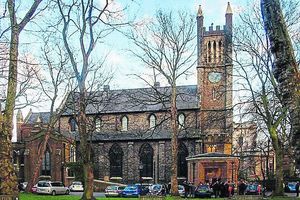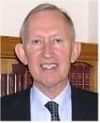Among the various churches recommended by the Daily Telegraph for Christmas worship last December was a parish church in West London called Holy Trinity, Brompton. The vicar of this ‘thriving Anglican evangelical church’, wrote the concerned reporter, is ‘the Rev. Sandy Millar, a pioneer of the Alpha courses … and a persuasive preacher who wins many converts’. Two days earlier, on 20 December, the newspaper had featured a leader by Jonathan Aitken, the former Tory cabinet minister, still struggling to clear his name from political scandal. Aitken bared his soul and acknowledged that he had been one of the half million who had completed the Alpha course during 1997. He had found it ‘helpful’ in his ‘vale of misery’. Its spiritual impact merged into his life’s pilgrimage, which began in Dublin in the 1940s when, as a child seriously ill with TB, he had been nursed back to health by an indomitable Irish nun.
A recent edition of Alpha’s own publication, Alpha News, featured the smiling face of Cardinal Thomas Williams, Primate of New Zealand. Along with his bishop and twenty other Catholics, the cardinal attended an Alpha conference last July and gave the opening address. ‘I am … ready and willing’, he declared, ‘to absorb all I can of what I already know to be a remarkably effective course.’ In the same issue of Alpha News, the Roman Catholic Bishop of Hexham and Newcastle, Ambrose Griffiths, commends Alpha at length. It is, he says, user-friendly, non-confrontational and fun; people ‘feel affirmed and enjoy it’; nor does it contradict Catholic teaching, even if ‘it does not go as far in some aspects as we would want to go’. Clearly, the Catholic hierarchy see great potential for their church in the Alpha course. And little wonder, when figures published in January show a weekly fall of 25,000 in those attending mass in England and Wales.
Alpha and the churches
If a church becomes a sponsor, it is listed by geographical region in the Alpha Register, along with many hundreds of Anglican, Methodist, Baptist, United Reformed, New Life, Salvation Army, Roman Catholic and Evangelical churches throughout Great Britain. There is an international register too, with courses set up or planned in sixty different countries, including Hong Kong, Russia, USA, Finland, South Korea and Germany. 1998 is intended to be a big year, with plans afoot to expand greatly on the 4,200 courses already running in the UK. The aim is to make the course accessible to every non-churchgoer by the autumn.
However, this movement does not focus on churches in an institutional way. Rather, it recruits people into small discussion groups, which meet in any suitable venue, such as a hospital, school, prison, home or parish hall. Course leaders, instructed by the ‘training manual’, are groomed to introduce charismatic nuances, including the hope that individuals will participate in ‘small group ministry’ or even in a ‘healing evening’. Suggestions also include ‘encouraging the person to start to talk in another language’, and they are not talking about French or Russian!
Those invited will decide for themselves about joining, but those leading the courses are allowed little flexibility. Course leaders are told to stick to the directions given in the various manuals and handbooks, obtainable only from Alpha-registered bookshops. All are welcome to buy Alpha sweatshirts, posters, cookbooks, videotapes (positively these!), CDs and car stickers. The potential profits are as large as the theological base is narrow. Read or listen to Sandy Millar or Nicky Gumbel, and you have explored Alpha’s major contours; contact Holy Trinity, Brompton, on the listed phone number, and you are at the fount of the movement’s wisdom.
Alpha News cautions would-be imitators. ‘Holy Trinity Brompton asks that the name “Alpha” or names similar should not be used in connection with any other Christian course.’ Presumably it ‘asks’ rather than ‘demands’, because ‘Alpha’ happens to be a Bible word. Moreover, it is a name that belongs uniquely to the Lord Jesus Christ (Revelation 1:11)! And that leads to a number of fundamental questions. Is course doctrine consonant with the teaching of the Bible? Is it calculated to bring glory to the Lord Jesus Christ? The answers are not encouraging.
Where the Alpha course is leading
Alpha Manual, first published in 1993, was reviewed at length in Evangelical Times in August 1996. Youth Alpha Manual, published in 1996, is much the same as its adult predecessor. There is the same blatant emphasis on healing and tongues — ‘Go with the flow! Open your mouth and begin to speak’; ‘Try on your own in your room’ (Youth p.36). These manuals promote decisionism and low views of human depravity. They contain minimal teaching on God and his sovereignty, on Christ, the cross, justification, regeneration, faith and repentance. There is a disproportionate emphasis on Satan, and seriously flawed teaching on guidance. It is all there to be discovered by the biblically alert. Unfortunately, those most likely to be caught up in the Alpha movement are the least likely to know the Scriptures.
It must be acknowledged that the manuals provide for some exposure to biblical truth. A gracious and sovereign God, who often works in the most unlikely places, will save some who join this movement. Along with much hollow self-congratulation, Alpha News does, in fact, carry some moving testimonies of changed lives. Nonetheless, thousands will be misled by its manifest distortions of the gospel.
Does ‘Alpha course fever’ presage some ‘new thing’ for churches tiring of the Toronto blessing? Certainly, the latter’s manic manifestations cannot be sustained much longer. Is the Alpha course phenomenon a gentler interlude which, nonetheless, will carry forward the charismatic cause? Whether such is the case or not, one thing is clear. This fever will inch its adherents inexorably closer to the Roman Catholic Church. Rome has welcomed the courses, and waits with consummate patience to embrace those who wander from the path of Scripture. Rome is where charismatic doctrine has pointed in the past, and Rome is where it is heading in the future. Experience as the final arbiter of Scripture will easily become tradition as the final arbiter of Scripture. The true church should pray for those caught in the delusions of false Christianity; not least for those ensnared by Alpha courses.










